BusinessEurope Headlines No. 2017-08
President Marcegaglia addresses first EU Industry Day
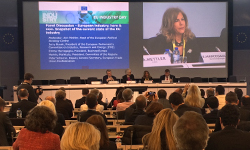 "We see some positive economic developments in Europe, but many industrial sectors face severe challenges, that's why we need to deliver now", said President Emma Marcegaglia at the first EU Industry Day on 28 February 2017. She discussed ‘Snapshot of the current state of the EU industry’ together with ITRE President Jerzy Buzek, Committee of the Regions President Markku Markkula and Peter Scherrer from ETUC. The event was hosted by European Commission Vice-President Jyrki Katainen and it is planned to continue the format on an annual basis. Marcegaglia concluded that "it is important to develop an ambitious action plan with a clear timetable because mainstreaming competitiveness is delivering only occasionally".
"We see some positive economic developments in Europe, but many industrial sectors face severe challenges, that's why we need to deliver now", said President Emma Marcegaglia at the first EU Industry Day on 28 February 2017. She discussed ‘Snapshot of the current state of the EU industry’ together with ITRE President Jerzy Buzek, Committee of the Regions President Markku Markkula and Peter Scherrer from ETUC. The event was hosted by European Commission Vice-President Jyrki Katainen and it is planned to continue the format on an annual basis. Marcegaglia concluded that "it is important to develop an ambitious action plan with a clear timetable because mainstreaming competitiveness is delivering only occasionally".
Contact: Nicolas Rathauscher
Changing the insolvency stigma in Europe
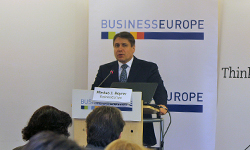 The European Commission’s proposal on restructuring frameworks and second chance is one important measure to fight the prejudice against business failure in Europe. Markus J. Beyrer said: “Although success does not always come at the first shot, lack of it should not mean the end of the entrepreneurial venture.” Viable companies need a legal and cultural framework that allows them to bounce back. These were some of the conclusions of the conference ‘Preventive restructuring and second chance for entrepreneurs: what’s in it for SMEs?’ organised jointly by BusinessEurope, the Maltese Presidency, ACCA and UEAPME. The conference brought together the three EU institutions and representatives of the business and accountancy world to discuss the way this proposal should be carried forward.
The European Commission’s proposal on restructuring frameworks and second chance is one important measure to fight the prejudice against business failure in Europe. Markus J. Beyrer said: “Although success does not always come at the first shot, lack of it should not mean the end of the entrepreneurial venture.” Viable companies need a legal and cultural framework that allows them to bounce back. These were some of the conclusions of the conference ‘Preventive restructuring and second chance for entrepreneurs: what’s in it for SMEs?’ organised jointly by BusinessEurope, the Maltese Presidency, ACCA and UEAPME. The conference brought together the three EU institutions and representatives of the business and accountancy world to discuss the way this proposal should be carried forward.
Contact: Pedro Oliveira
Alternative methodology in anti-dumping
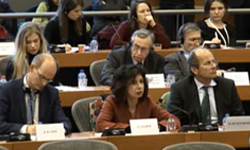 “We need to reflect on how efficient and effective our Trade Defence Instruments are. This is not about one country or one sector only, it is about business as a whole”, Director of International Relations Luisa Santos said on 28 February at the hearing organised by the International Trade Committee of the European Parliament. “Economic operators need legal certainty, and with the basic legislation currently under challenge at the WTO, BusinessEurope considers it important to assess how our legal framework can be put on a stronger footing with regard to WTO compatibility”, Ms Santos added. BusinessEurope believes the new EU methodology should be based on the following key principles: compliance with WTO and EU rules, objectiveness of the criteria (market distortions should be determined on the basis of objective and technical criteria, not on political considerations), effectiveness in restoring a level playing field and workability for the industry, with no additional burden on EU economic operators.
“We need to reflect on how efficient and effective our Trade Defence Instruments are. This is not about one country or one sector only, it is about business as a whole”, Director of International Relations Luisa Santos said on 28 February at the hearing organised by the International Trade Committee of the European Parliament. “Economic operators need legal certainty, and with the basic legislation currently under challenge at the WTO, BusinessEurope considers it important to assess how our legal framework can be put on a stronger footing with regard to WTO compatibility”, Ms Santos added. BusinessEurope believes the new EU methodology should be based on the following key principles: compliance with WTO and EU rules, objectiveness of the criteria (market distortions should be determined on the basis of objective and technical criteria, not on political considerations), effectiveness in restoring a level playing field and workability for the industry, with no additional burden on EU economic operators.
Contact: Eleonora Catella
The regulation-innovation link
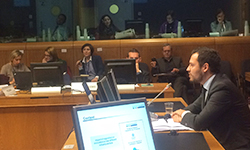 The way we regulate determines to large extent how we innovate. Well-drafted legislation can stimulate innovation; however poor legislation can stifle it. As a follow-up to previous activities, BusinessEurope presented evidence on how strongly regulation influences the innovation capacity and activities of the private sector. The new repository of examples, collected and published at the end of 2016, was presented in the European Council meeting, 22 February, by BusinessEurope’s Senior Adviser Jan Bambas. He also proposed next steps to address key concerns of the industry. Jan presented the case-study to representatives of the member states, explaining how the variety of situations observed and criteria can contribute to ongoing work of the EU institutions. He linked this latest exercise to concrete activities on EU and national level, namely in terms of the ongoing revision of the Better Regulation Toolbox and to work of the REFIT platform. Together with the representatives of CEFIC and CEN/CENELEC he also elaborated on the Innovation principle and other tools to make regulation more conducive to innovation.
The way we regulate determines to large extent how we innovate. Well-drafted legislation can stimulate innovation; however poor legislation can stifle it. As a follow-up to previous activities, BusinessEurope presented evidence on how strongly regulation influences the innovation capacity and activities of the private sector. The new repository of examples, collected and published at the end of 2016, was presented in the European Council meeting, 22 February, by BusinessEurope’s Senior Adviser Jan Bambas. He also proposed next steps to address key concerns of the industry. Jan presented the case-study to representatives of the member states, explaining how the variety of situations observed and criteria can contribute to ongoing work of the EU institutions. He linked this latest exercise to concrete activities on EU and national level, namely in terms of the ongoing revision of the Better Regulation Toolbox and to work of the REFIT platform. Together with the representatives of CEFIC and CEN/CENELEC he also elaborated on the Innovation principle and other tools to make regulation more conducive to innovation.
![]() Contact: Jan Bambas
Contact: Jan Bambas
Business helps implementation of Paris Agreement
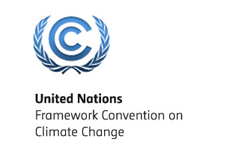 Ahead of the Bonn Climate Change Conference in May 2017, BusinessEurope made an important submission to the secretariat of the United Nations Framework Convention on Climate Change (UNFCCC) on how to further enhance the engagement of business and other non-Party stakeholders in the UNFCCC negotiation process. This enhanced engagement is essential for delivering the ambitions of the Paris Agreement agreed at COP21.
Ahead of the Bonn Climate Change Conference in May 2017, BusinessEurope made an important submission to the secretariat of the United Nations Framework Convention on Climate Change (UNFCCC) on how to further enhance the engagement of business and other non-Party stakeholders in the UNFCCC negotiation process. This enhanced engagement is essential for delivering the ambitions of the Paris Agreement agreed at COP21.
![]() Contact: Leon de Graaf
Contact: Leon de Graaf
Deepening EMU and restoring competitiveness to support investment
 Ahead of the publication of the European Commission’s new proposals to deepen Economic and Monetary Union (EMU), BusinessEurope has written to European Commission President Juncker setting out the measures we believe are necessary in this area to support investment and growth. In the letter, BusinessEurope President Emma Marcegaglia states that completing EMU and strengthening trust in the euro is both a priority and a matter of urgency for business. She urges the European Commission to reignite the process of strengthening EMU by setting out the remaining steps needed to complete it. Alongside calls for further economic, financial and fiscal union, the letter also encourages the EU to use all its available tools to strengthen the support and incentives for Governments to orientate their public expenditure towards high quality investment.
Ahead of the publication of the European Commission’s new proposals to deepen Economic and Monetary Union (EMU), BusinessEurope has written to European Commission President Juncker setting out the measures we believe are necessary in this area to support investment and growth. In the letter, BusinessEurope President Emma Marcegaglia states that completing EMU and strengthening trust in the euro is both a priority and a matter of urgency for business. She urges the European Commission to reignite the process of strengthening EMU by setting out the remaining steps needed to complete it. Alongside calls for further economic, financial and fiscal union, the letter also encourages the EU to use all its available tools to strengthen the support and incentives for Governments to orientate their public expenditure towards high quality investment.
![]() Contact: James Watson
Contact: James Watson
BusinessEurope’s first-hand trade experience
 The visit to the Port of Antwerp and the Antwerp World Diamond Centre (AWDC) that was organised on 22 February 2017 was an excellent opportunity for the International Relations department of BusinessEurope to see how trade takes place in practice. As an organisation advocating for growth and representing the interests of European businesses, it is important for BusinessEurope to remain close to business in order to be able to better understand their needs and see how trade policy is being implemented throughout the supply chain: from the moment a rough diamond is extracted to the moment is arrives to the consumer in the form of jewellery, or from the moment goods arrive at the Port of Antwerp in a container to the moment they leaves the port to reach other destinations – a factory or a retailer’s shop. The application of tariffs, customs procedures, trade policy regulations all have an impact on the day-to-day operations of companies and understanding this is crucial for improving trade policy.
The visit to the Port of Antwerp and the Antwerp World Diamond Centre (AWDC) that was organised on 22 February 2017 was an excellent opportunity for the International Relations department of BusinessEurope to see how trade takes place in practice. As an organisation advocating for growth and representing the interests of European businesses, it is important for BusinessEurope to remain close to business in order to be able to better understand their needs and see how trade policy is being implemented throughout the supply chain: from the moment a rough diamond is extracted to the moment is arrives to the consumer in the form of jewellery, or from the moment goods arrive at the Port of Antwerp in a container to the moment they leaves the port to reach other destinations – a factory or a retailer’s shop. The application of tariffs, customs procedures, trade policy regulations all have an impact on the day-to-day operations of companies and understanding this is crucial for improving trade policy.
Contact: Luisa Santos
Calendar
- 3 March 2017: Employment, Social Policy, Health and Consumer Affairs Council
- 8 March 2017: Tripartite Social Summit
- 9-10 March 2017: European Council
- 15 March 2017: Elections in the Netherlands